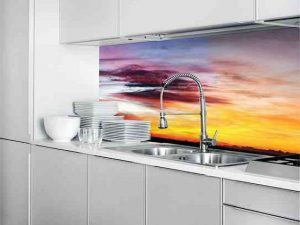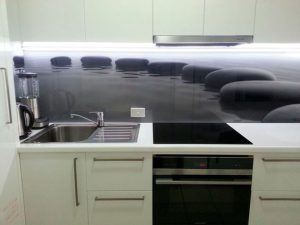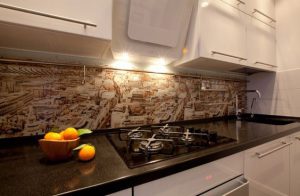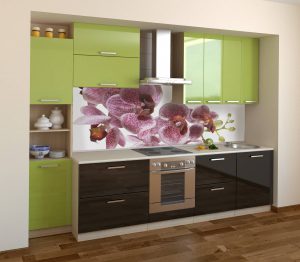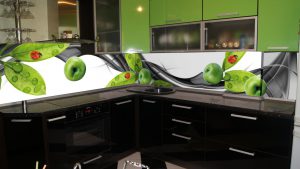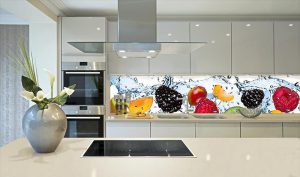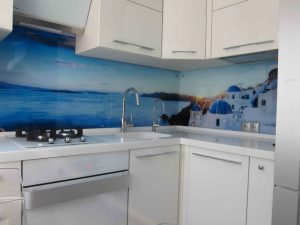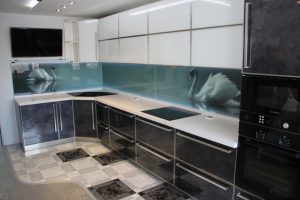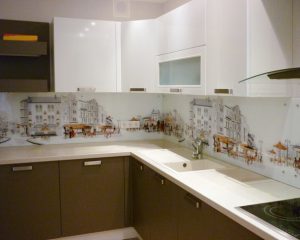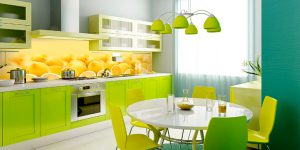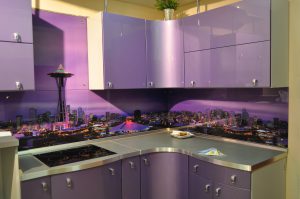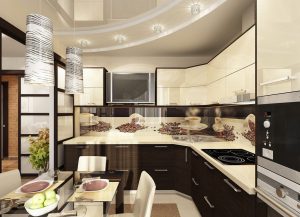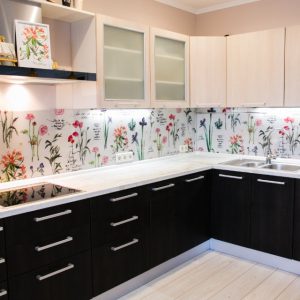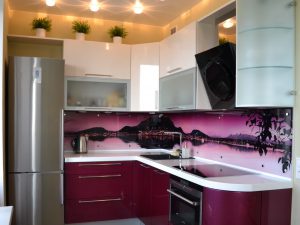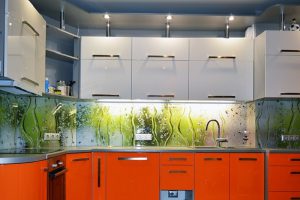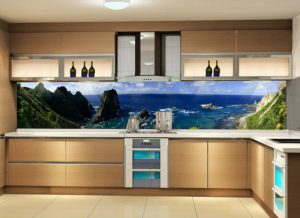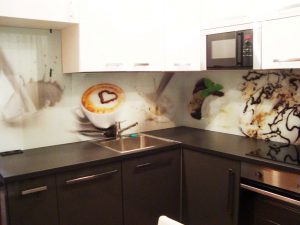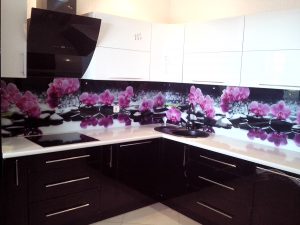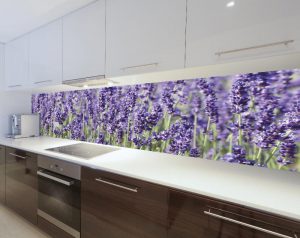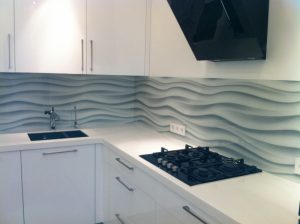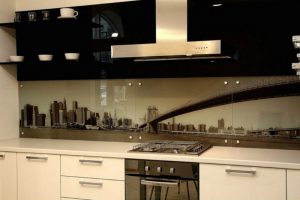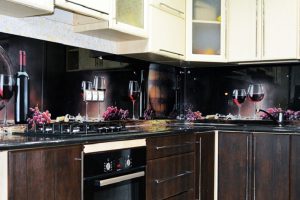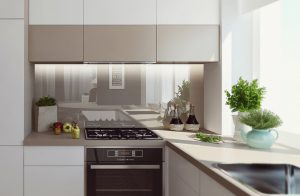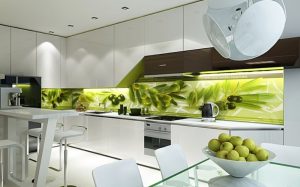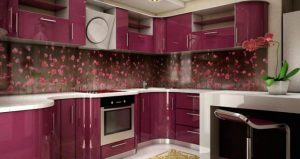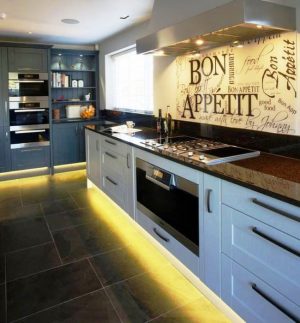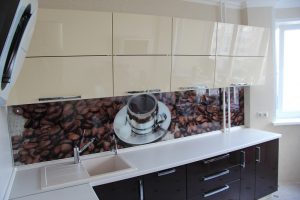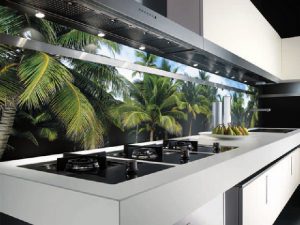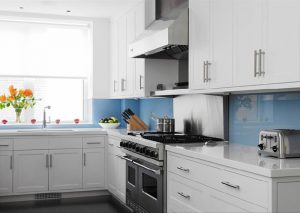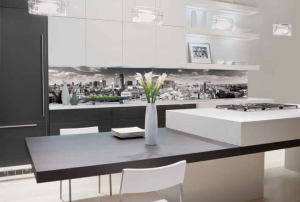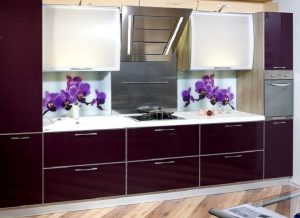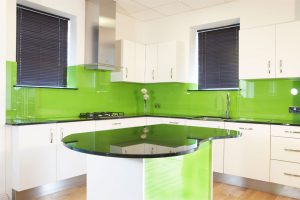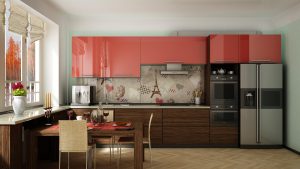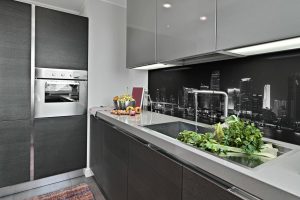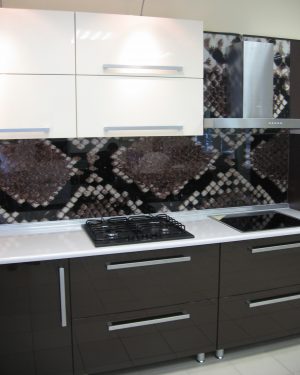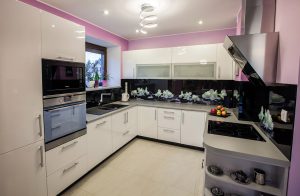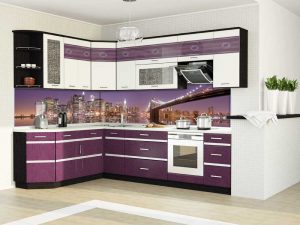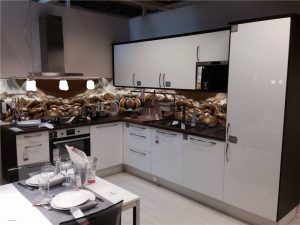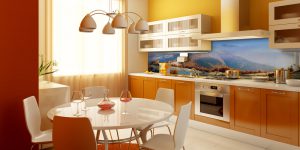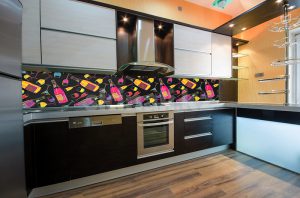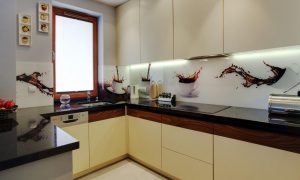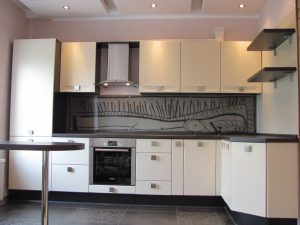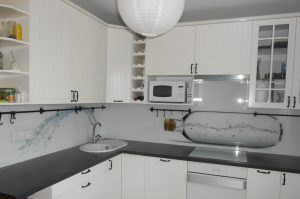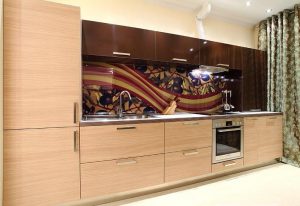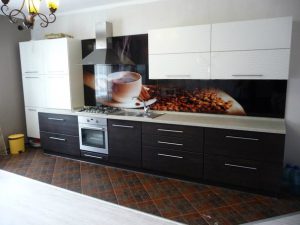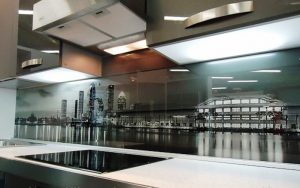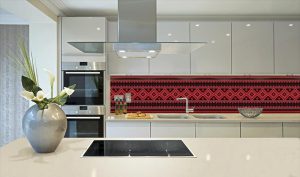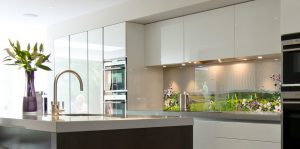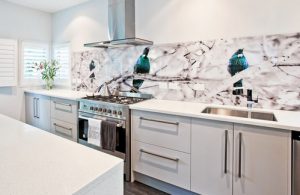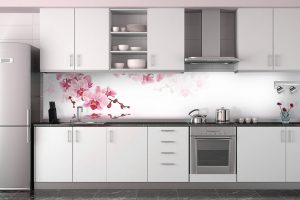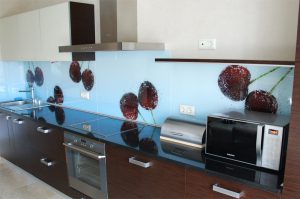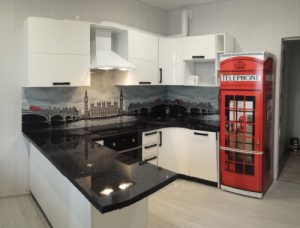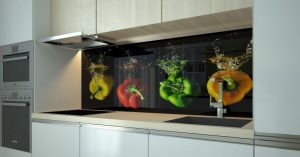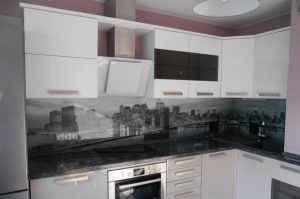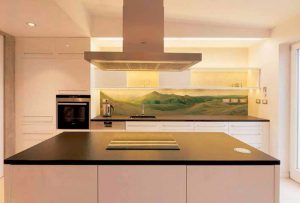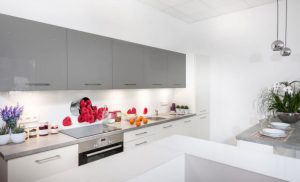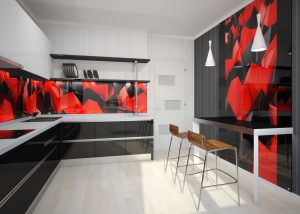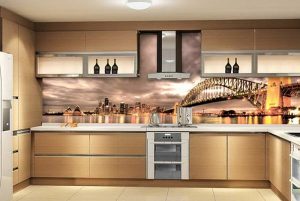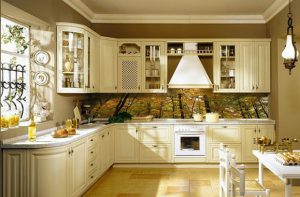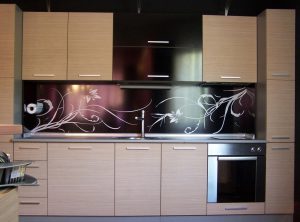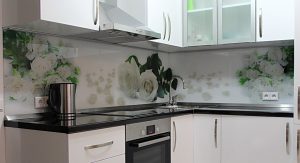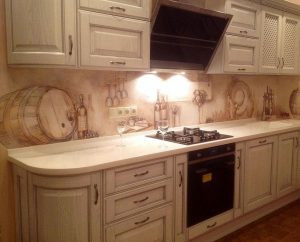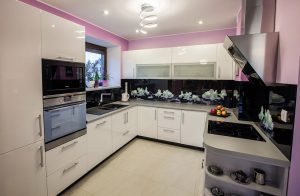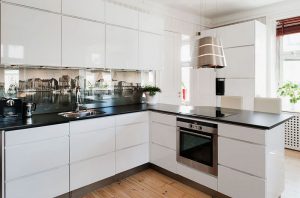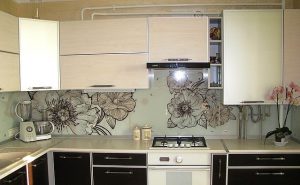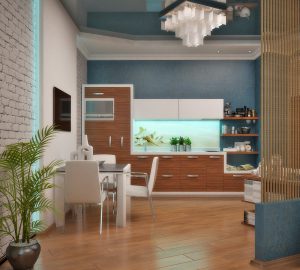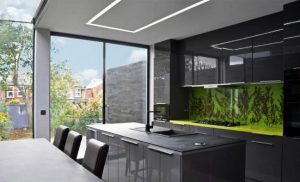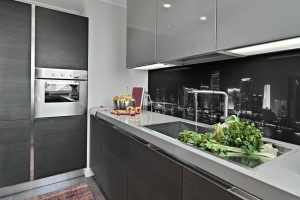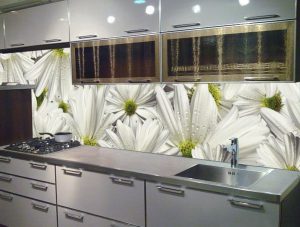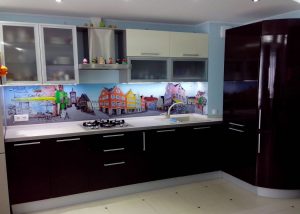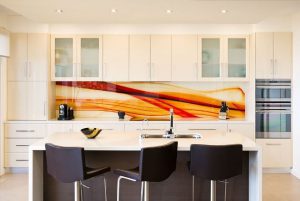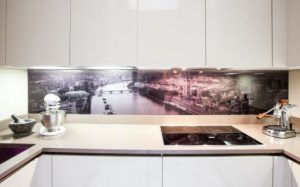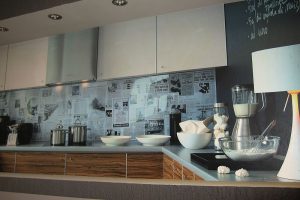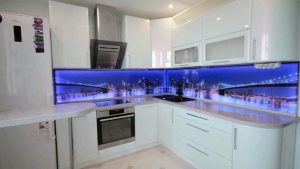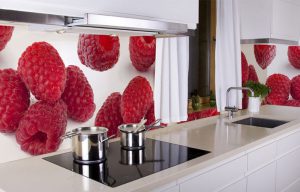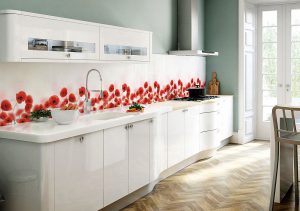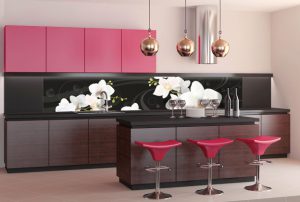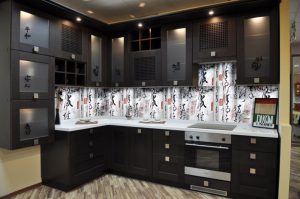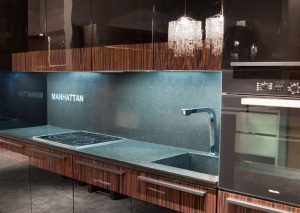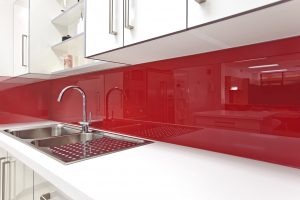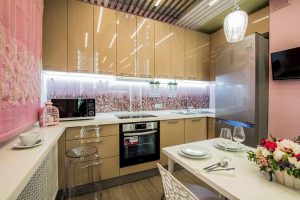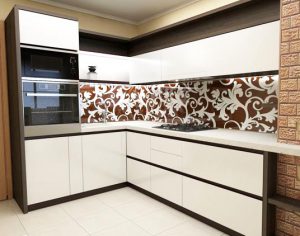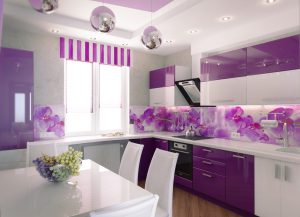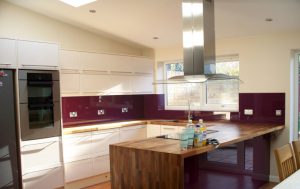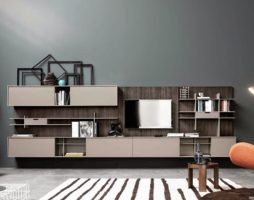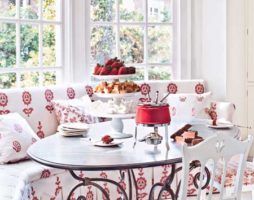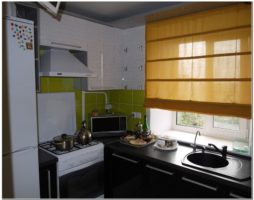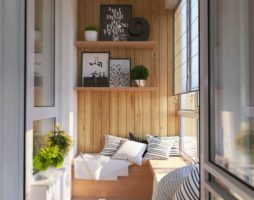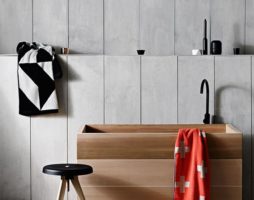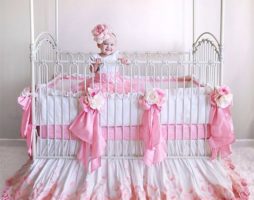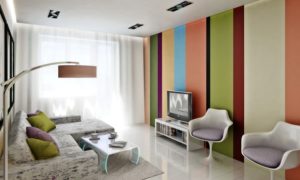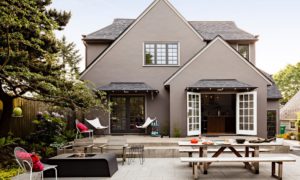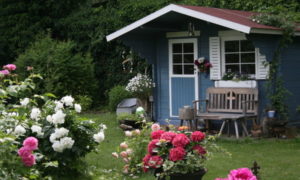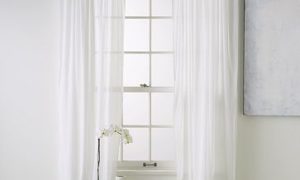During the renovation of the kitchen or when replacing kitchen furniture, special attention is paid to the section of the wall in contact with work surfaces. The change in its appearance is dictated not only by the desire to harmonize new furniture with interior design or the desire to slightly update the situation, but also by a purely practical approach, because this is the most "suffering" part of the wall from pollution.
Naturally, it has to be cleaned regularly and quite intensively, which means that the finish of the zone must be of the appropriate quality. Before the appearance of skinali for the kitchen, the apron was laid out with tiles, plastic panels, covered with a polymer film or resorted to the most budgetary methods: they painted it or covered it with washable wallpaper. Each method was good in its own way. Wear-resistant and expensive tiles were most aesthetically perceived in the decor of kitchens.

Skinali for the kitchen from tiles
Washable wallpapers looked good and were reasonably priced, but lacked durability. Thus, there is a need to invent a universal way to design an apron that could last a long time, cost moderately and look attractive at the same time. All these qualities are possessed by specific glass, which has become a new word in kitchen design.

Skinali for the kitchen made of glass
What are we talking about?
Designers called skinals glass panels on which an image is applied from the inside. Initially, such elements were only an apron prerogative, but over time they were skinned for the kitchen and began to be used in wall decor, as well as in ceiling decoration and in the form of facade inserts in sets.

Bright skinali for the kitchen made of glass
The novelty attracts consumers with the brilliance and variety of the proposed picture plots. With their appearance, a kitchen apron can take on the appearance of a real work of art. Photo printing of images on glass is carried out in such amazing quality that the pictures literally come to life, and the shine of the glass gives them a special cheerfulness. Even the most standard kitchen in a boring primitive design with the advent of skinali acquires individuality and looks like an author's work.

Skinali will make your kitchen bright and original
Types of skinali for the kitchen
For the decor of modern rooms, skinali from:
1. Artistic glass.
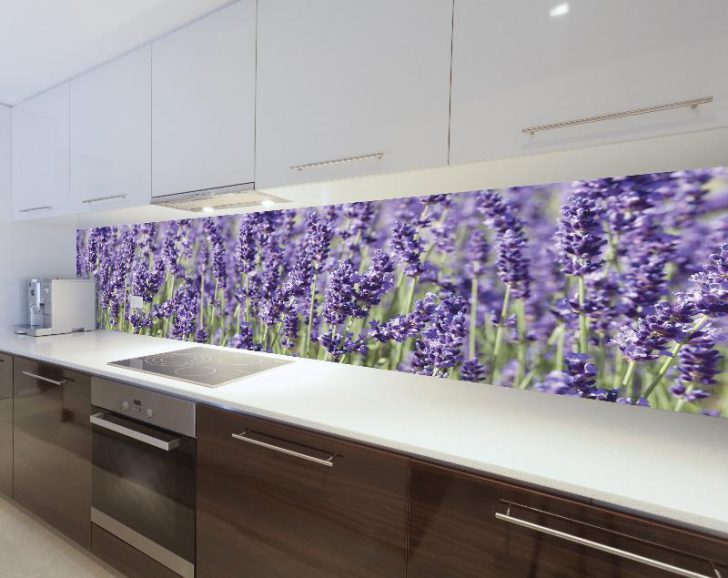
Skinali from art glass
2. Ordinary glass.
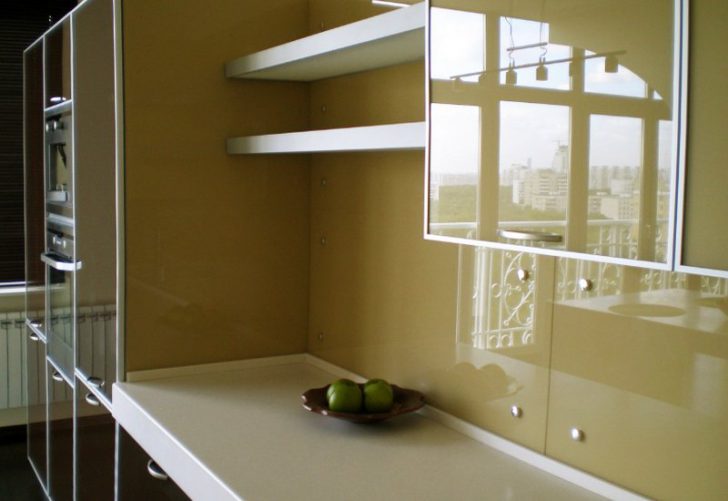
Skinali for the kitchen from ordinary glass
3. Plastic.
The first category includes all types of stained glass, including painted, mosaic, sintered, sandblasted and etched. Pseudo-stained glass and film technologies for decorating glass are popular.
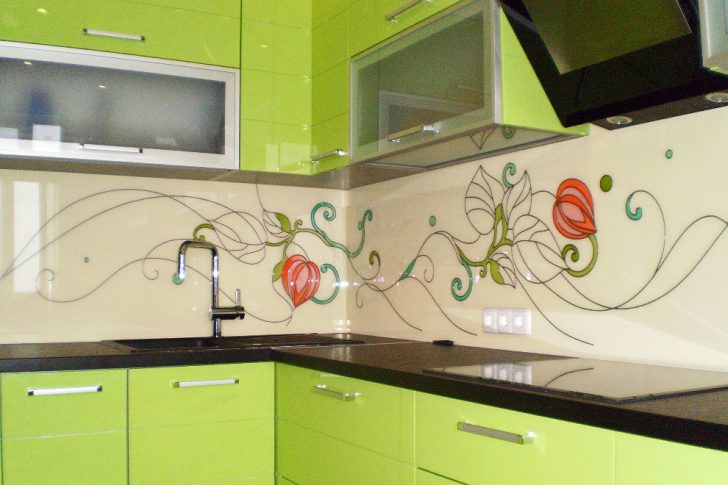
Skinali for the kitchen in the style of pseudo stained glass
In the second category: mirrors, patterned and colored glass.

Mirror skinali for the kitchen
In the third - post-formed, decorative and compensatory plastic, as well as backing, engraving and more.

Skinali imitating engraving
Advantages of glass apron
The microclimate of the kitchen belongs to the class of complex, therefore, non-traditional solutions and the use of heavy-duty materials that are ready to withstand temperature and humidity fluctuations, the effects of boiling fats and steam are welcome in the arrangement of the premises. The working area suffers especially from these irritants, and therefore it must be designed accordingly.

Skinali resistant to environmental influences
Skinali became a godsend for the kitchen. Why?
– With their participation, interiors of amazing beauty are created.
– Despite the fact that aprons of a similar texture look incredibly original and aesthetically pleasing, keeping them clean and tidy does not cause excessive trouble.

Skinali are quite easy to care for.
- Provided that the skinals were made of triplex or tempered glass, they are absolutely safe both in environmental and physical aspects. Such a finish will last a long time, and without losing its original beauty. Glass will not turn yellow, will not burn out, will not poison with the release of toxins, as can happen in the case of using plastic counterparts.

Skinali made of glass is more practical than plastic counterparts
– As an original decor, skinals for the kitchen have a pronounced psycho-emotional impact and serve the overall interior environment in the most comfortable and cozy way.
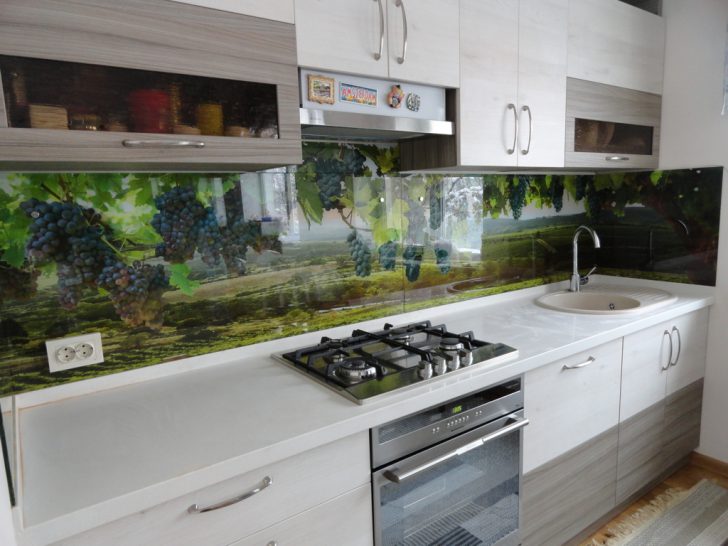
Skinali will make the kitchen cozier
Skinali design
glass base
The special strength of the decorative element is provided by a high-quality base, which is high-tempered glass. Its strength is five times higher than that of ordinary window glass. Being a heavy material, simple glass can crack under its own weight. It does not threaten the components.
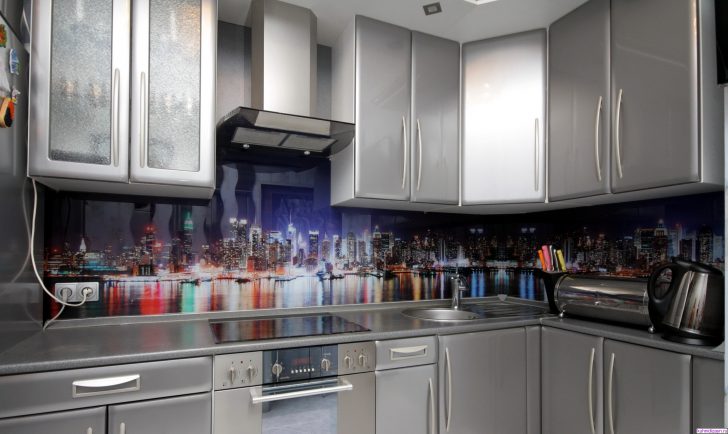
The basis of the skinali is high tempered glass
Tempered glass is an expensive raw material. Sometimes in decors they try to replace it with more budgetary plexiglass or plastic. The downside of such skinali for the kitchen will be weak expressiveness in aesthetic terms, since not every type of drawing can be applied to such materials.

Only several types of drawings can be applied to plastic skinali
The plastic base does not respond well to temperature fluctuations and ultraviolet light, which can provoke its deformation and fading of the pattern, although with careful operation, the plastic versions of the skins can stand in the kitchen for a dozen or even more years.

Temperature fluctuations can cause plastic deformation
For comparison: the service life of glass aprons is not limited.
Drawing
“With the help of stereo printing, glass-based drawings for the kitchen get a 3D effect”
You can apply images to kitchen skins in a variety of ways. Popular:
1. Photo printing.
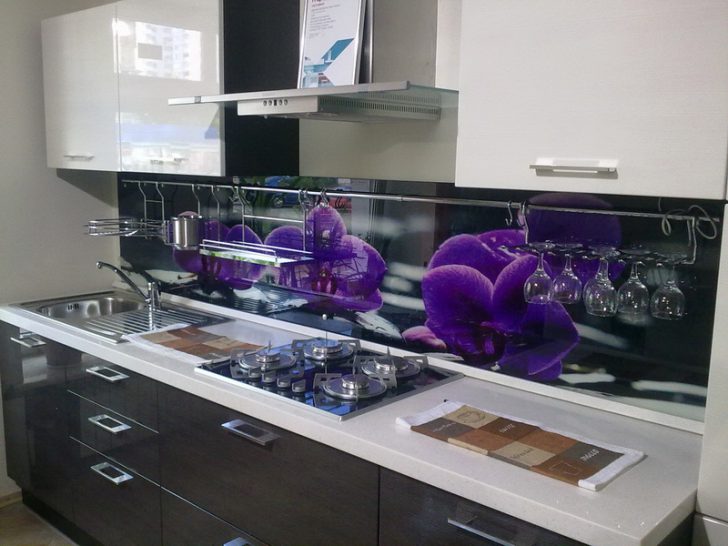
Skinali for the kitchen with photo printing
2. Stereo printing.
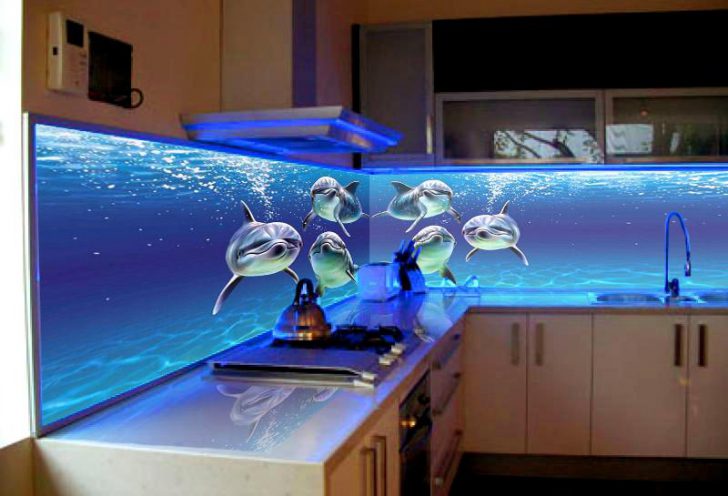
Volumetric skinali for the kitchen with stereo printing
3. Film coating.

Film coating on skinali for the kitchen
The silk-screen printing method is used somewhat less frequently, and laser engraving of skinals for the kitchen generally belongs to the category of exceptions.
Photo printing.
The method generates the illusion of three-dimensionality of the image. The compositions recreated in this way make it possible to radically change the perception of the surrounding space, they make it so deep and expressive. The main principle of choosing the plot of the image is its harmonization with the color scheme of the interior. It is also important that the scale of the panel adequately correlates with the volumes of the kitchen, unless, of course, the designer's fantasy provides for a different interpretation of the appearance of an unusual decor.
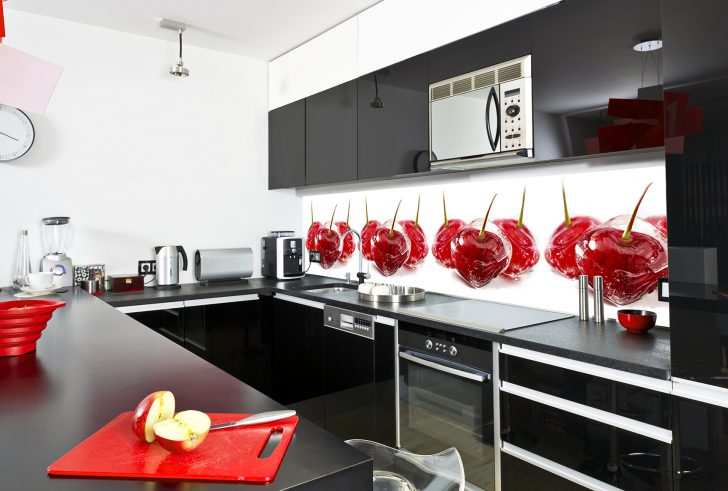
Skinali with photo printing create a three-dimensional effect
stereo printing. With its help, drawings on a glass basis were skinned for the kitchen and get a 3D effect. For work use special ink. Printing of paintings is not limited by subject.You can get any desired image, and it will be in excellent resolution and high quality.

Skinali for the kitchen with a 3D effect
Film. You can apply a pattern to glass by pasting a beautiful film. Its texture can be plain, matte, transparent, covered with drawings and patterns, including three-dimensional, 3D-style, and embossed. The technology of decorating glass with a film significantly reduces the cost of production of skinals, which makes the decorative material even more affordable and popular.

Skinali with a film pattern
The use of a high quality film and the fact that the apron fits snugly against the wall eliminates the possibility of its detachment when steam enters. Does not threaten such skins, created to decorate the kitchen, and discoloration of the pattern.
back to index ↑Which glass to prefer in a decorative panel
In the construction of a glass apron, bases of transparent and matte quality with a perfectly smooth or structured surface can be used.
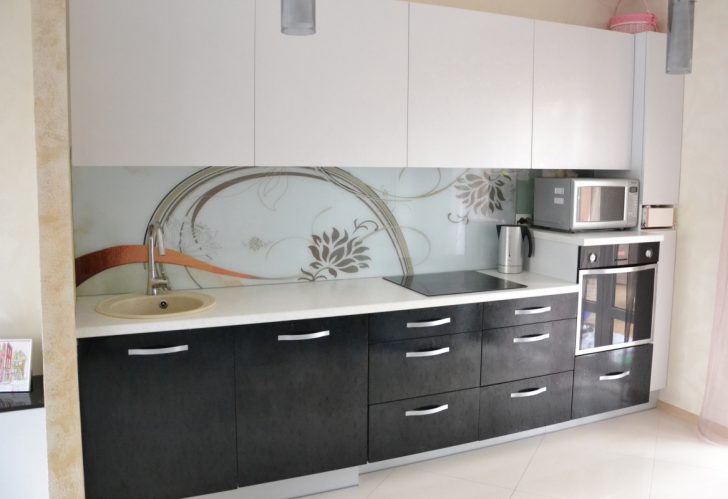
Skinali for the kitchen with a matte surface
The most practical option, experts consider the option with a smooth surface, decorated with UV printing.
The most popular invoices include:
1. Krizet.

Skinali with texture krizet
2. Satin.
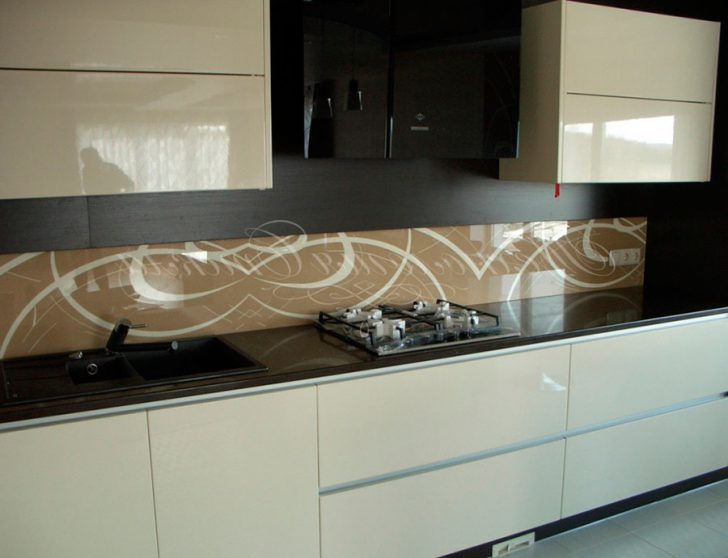
Skinali with satin texture
3. Listarl.
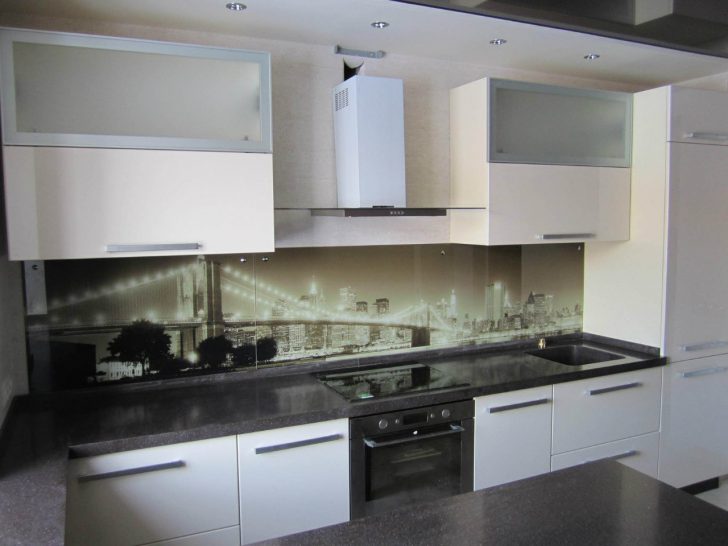
Listarl panels for the kitchen
The thickness of the glass base varies between six and eight millimeters.
Recently, the demand for discolored, that is, absolutely transparent bases, has increased. The glass in them cannot have a bottle shade. Such skinals are good for decorating a white kitchen.
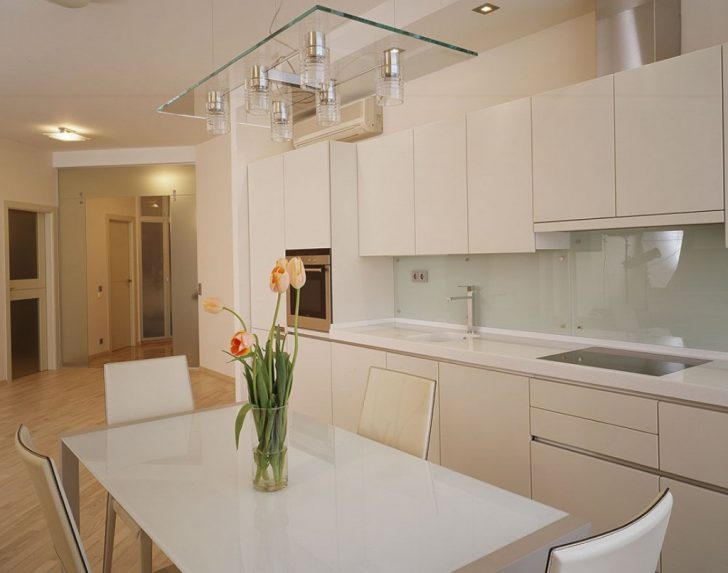
Transparent skinali for white kitchen
Dimensions of the glass apron
The recommended panel length is 2.5 meters. Skinals of greater length have a greater risk of damage, and it is difficult to mount them. Large items are difficult to transport. In general, it makes sense to divide a large-scale composition into separate fragments. With a well-executed installation, the joints in the panel will be absolutely invisible.
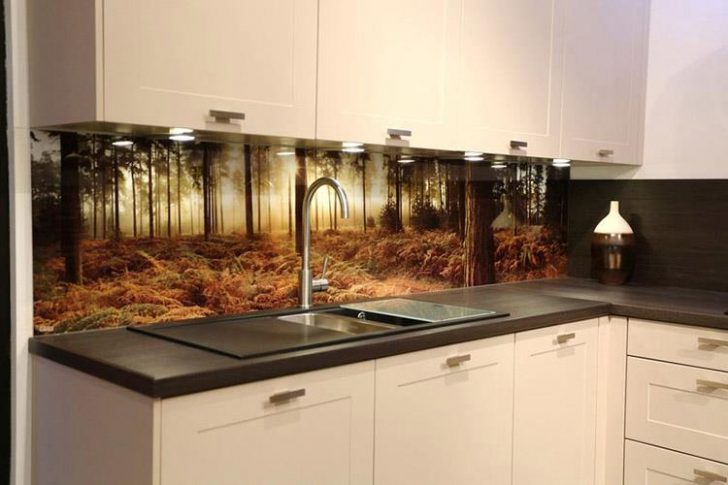
With proper installation, the joints between the panels were not noticeable
Backlight skinali
A kitchen apron, equipped with lighting, will become a central element of decor in the evening. It is better to highlight glass, the image on which was applied not with UV printing, but with latex ink. They are brighter in color and safer for health.
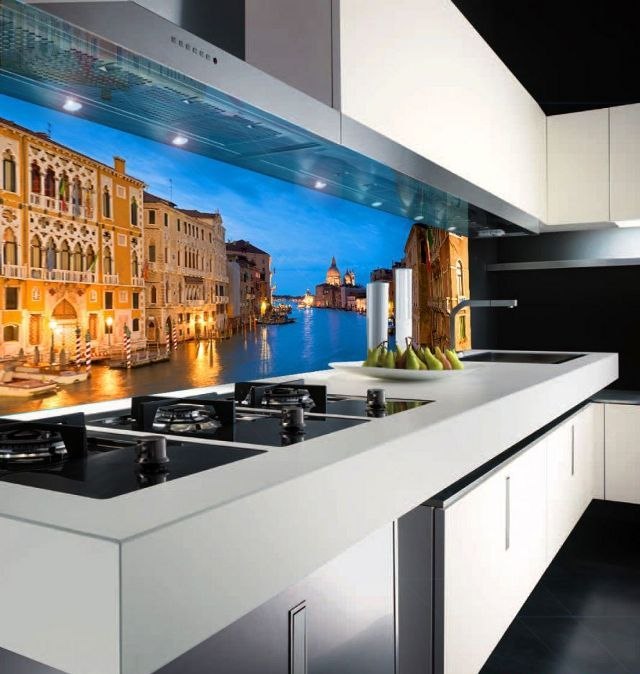
Skinali for the kitchen with lighting
There are two ways to organize the backlight of the apron panel. In the first case, the LED strip is placed along the ends of the panels, most often horizontally. For greater decorativeness, an aluminum profile is used, which has channels for masking electrical wiring and embedding LED strips. It can be found in silver, gold, champagne or cognac.

Backlight skinali LED tape
The profile package includes seals that hide the junction of the countertop with skins selected for your kitchen, which will save on skirting boards.
In the second case, the illumination of the panel is organized from the inside. The glass panel on small remote holders is moved away from the wall surface and LED lamps or the same LED strip are attached behind it. The first ones will have to be “drowned” in specially equipped niches. Beauty is guaranteed, but problems can arise with the uniformity of illumination of the apron and the adequacy of light dispersion, so decorative craftsmen usually insist on profile lighting.
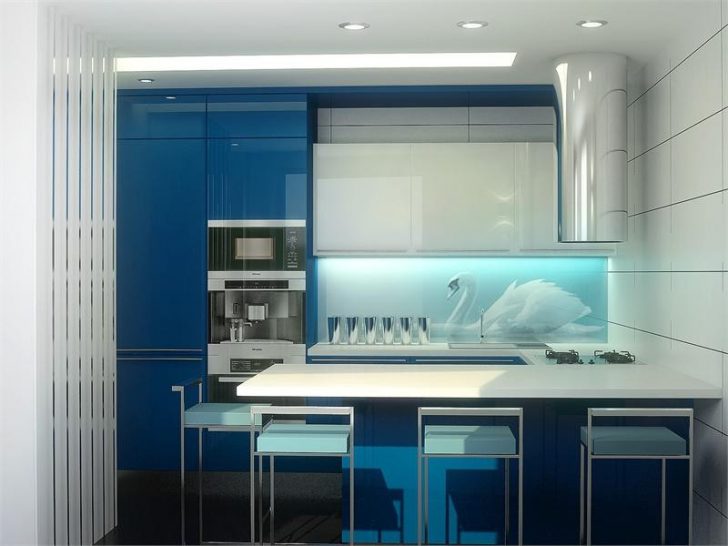
Skinali with illumination from inside the panels
Skin designers
"Professionals consider skinali to be the best solution for kitchen decor"
This is both protection and decoration, and sometimes additional lighting, at the same time.
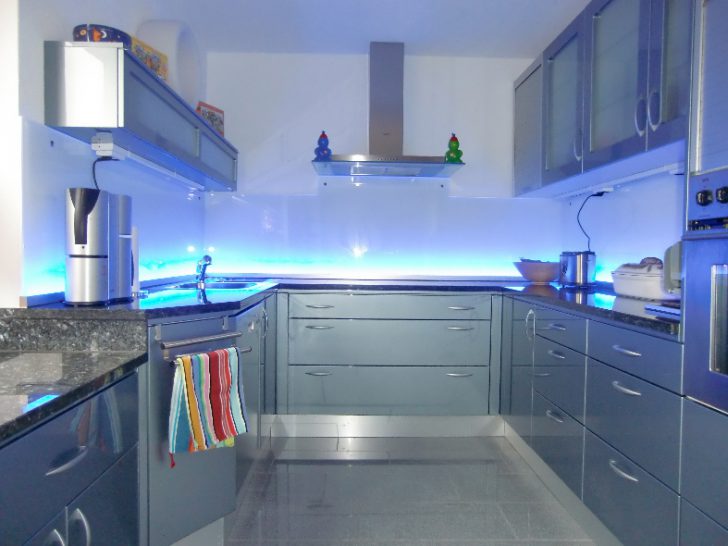
Skinali provide additional illumination
The best glass aprons are in interiors interpreted in the spirit of modern, super techno and, of course, hi-tech.
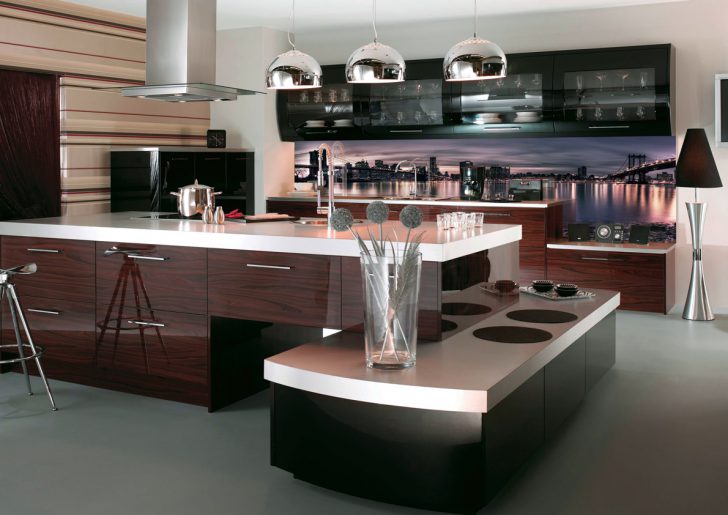
Skinali for the kitchen in high-tech style
For classic decors, panels with neutral patterns, monochromatic colors or imitating the structure of stones are suitable.
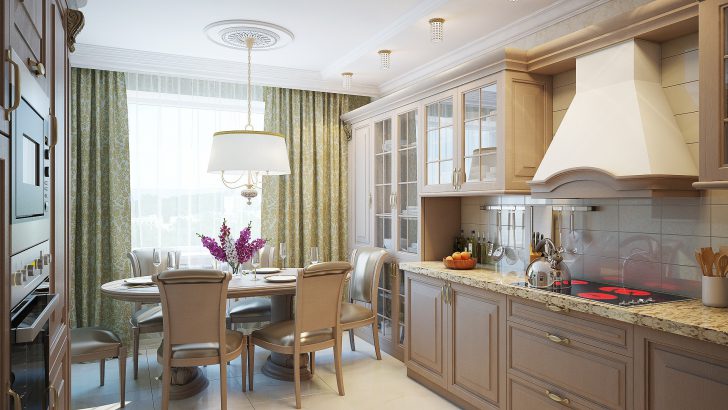
Transparent skinali for the kitchen in a classic style
The right choice of the plot of the apron will radically transform the room. For example, panoramic compositions will allow you to erase the boundaries of space, looking away into the distance. This is a great move for decorating small kitchens or rooms with a non-standard layout.
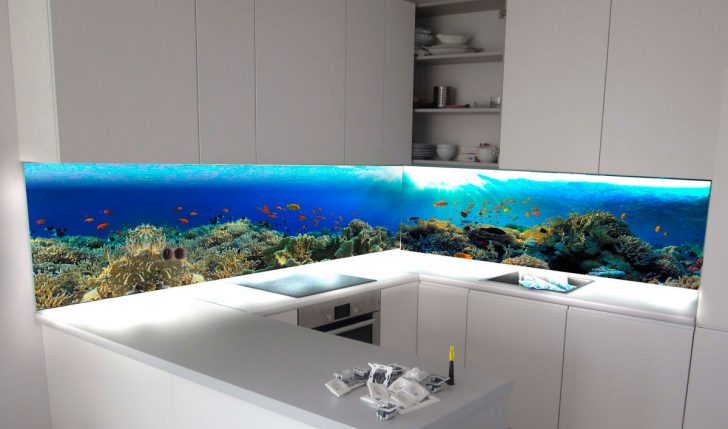
Panoramic skins for the kitchen visually increase the space
Skinals for finishing the kitchen can be used not only as a shield for the wall in the work area, they look great when inserted into the frame of the front door to the room or as doors for furniture cabinets and shelves.
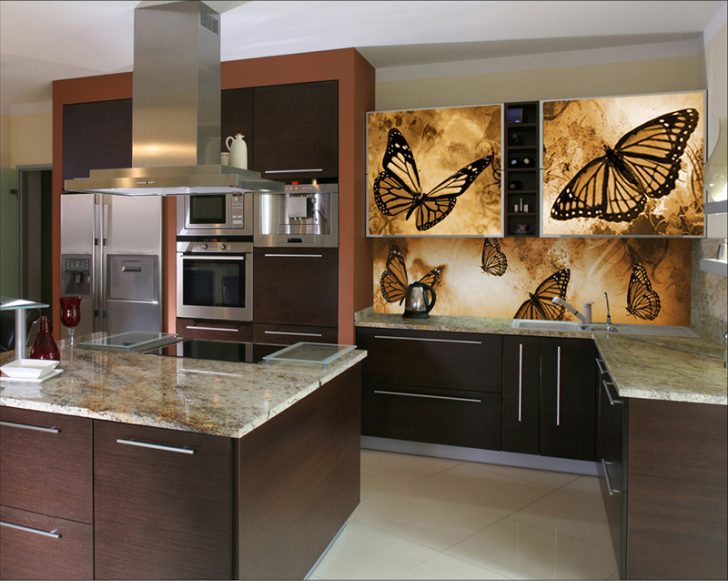
Skinali as a decor for kitchen furniture
Glass panels are easy to adapt to the surrounding interior. To do this, it is enough to introduce several mirror inserts into it or furnish the kitchen with a glass table.
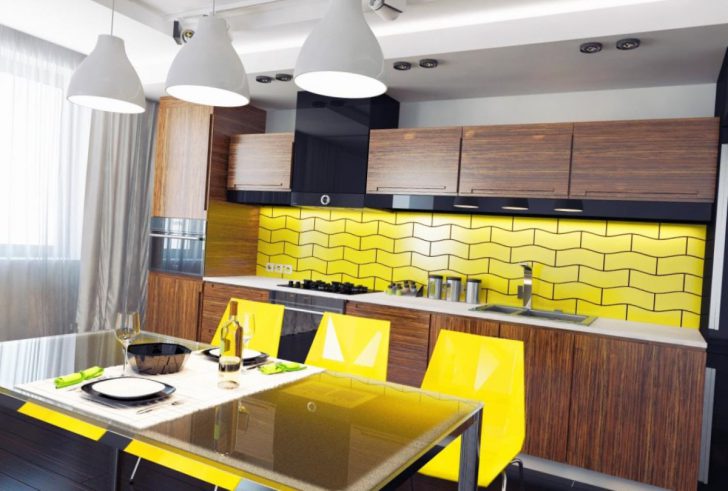
A table with a glass surface will complement the skinali
Replacing the usual ceramics in the backsplash with an unusual glass panel will add personality to the atmosphere. Such decor can claim the title of exclusive, especially if frames appear on the panel that tell about your personal life.
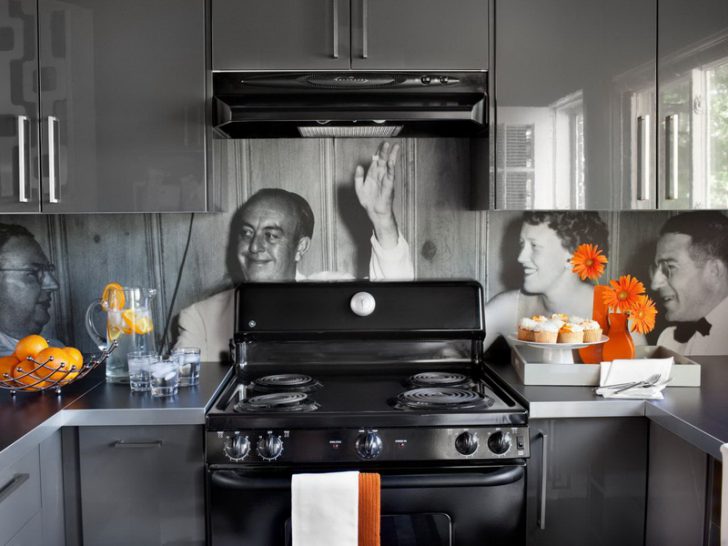
Skinali with personal photos
When choosing glass for skinali for a stylish kitchen, the following point should be taken into account. It may turn out that for a perfectly clear implementation of the idea, you will have to buy specific clarified glass. The nuance is that ordinary glass, although it seems really transparent, but when covering a picture made on a light background, it will show its bottle shade, “rewarding” the masterpiece with greenery, although when used in symbiosis with still lifes, city panoramas, landscape images - nothing of the kind will be noticeable.
back to index ↑Conclusion
Skinali for the kitchen, in models of which tempered glass, photo printing and LED lighting are combined, will become an indispensable interior detail, combining the functions of a decorative element, a protective panel, a space corrector and a lightbox. Moreover, containing all the advantages inherent in traditional finishing materials, glass panels are completely devoid of their shortcomings. And if we take into account that skinals have been granted a unique property to individualize the interior, then it is simply unnecessary to talk about the priority of their choice as a kitchen finish!
back to index ↑Photo gallery - skinali for the kitchen
Video
